Mahmood Awan (The News on Sunday, 22nd October 2017)
Bertolt Brecht (1898-1956) is an influential poet and playwright of not only the 20th century but of all times. There have always been diverging opinions about whether he is a better poet, drama theorist, or a playwright. Two people who were confronted by this very question were John Willett and Ralph Manheim, Brecht’s editors. They wrote: “It is bad luck that so many of us have been led to approach Brecht from the wrong end: studying the theories first, then the plays, and only coming to the poems as a by-product of his theatre work. In part this is due to the unavoidable difficulties of translation, since it is always simpler to translate expository writing than dialogue, while great poetry is ten times harder than even the finest play”. Willet and Manheim were the translation editors of Brecht’s Poems 1913-1956, published by Eyre Methuen in 1976.
After reading the letters Brecht wrote to H.R. Hays, his pioneering poetry translator, it becomes evident that Brecht himself was quite keen to be translated, and he made efforts to be personally involved in the process. In one of his letters to Hays in March 1945 Brecht wrote: “I should like to have the opportunity to write you this or that about the translations: I know one cannot ‘correct’ translations. Nevertheless, in the verses there are implications which may escape the most ingenious student of language and, above all, there are political implications which here and there we must discuss (lack of clarity in my writing, misconceptions, etc)”. And, Brecht did discuss this ‘here and there’ with Hays including his inclination to reject his early poetry because it was not ‘Marxist’, a suggestion that was not taken on board by Hays because that early poetry in Hays’ words was “of high calibre aesthetically”.
Hays wrote an insightful introduction to Brecht’s poetry translations, published in 1947, by calling him as an ‘Anti-Individualist’. We can however, contest Hays’ appreciation of anti-individualist poetry but his reading of Brecht’s aesthetics demands genuine appreciation especially when he talks about Brecht’s rejection of muddled romanticism and emotional self-indulgence while discovering aesthetic values in functionalism through his evolving form, diction, satire, despair and even cynicism.
While reviewing Punjabi poet and critic Mushtaq Soofi’s recently reprinted translations of Brecht, it becomes necessary to share insights about Brecht’s poetic world.
Unfortunately, there has been no focus whatsoever on world poetry translations into Punjabi in West Punjab. Najm Hosain Syed did translate some poems of Nazim Hikmet, Pablo Neruda, and recently Yannis Ritsos. But as far as I know, the first-ever book of poetry translations into Punjabi, was that of late Afzal Ahsan Randhawa’s Kaala Painda published by the Pakistan Punjabi Adabi Board in 1988, in which Randhawa translated 101 poems of African origin poets. Another effort worth mentioning is Irfan Malik’s translations of Swedish Poet Gosta Friberg titled Wadhda Hoya Ghaira published by Suchet in 2002.
Soofi writes in his brief introduction to Bertolt Brecht: German Shair tay Khedkaar that he had completed these translations back in 1981 but somehow didn’t publish these until 1997. He further informs us that his publisher, Gora Publishers in Lahore, disappeared from the market soon after these translations were published. Therefore, very few people knew that any such translations existed; the current reprint is an effort to make Brecht available to a wider Punjabi readership.
Soofi used the aforementioned Eyre Methuen’s published edition, as a reference for his Punjabi translations. There are nearly 500 poems in that edition and 35 translation contributors including H.R. Hays.
Soofi selected 125 out of those 500 poems for his work. He is quite successful in translating not only Brecht’s words but the entire emotional experience and underlying poetic tension. The death tone of some of Brecht’s early poems has been captured skilfully without any signs of forced labour.
‘Mother’ is a constant theme in Punjabi folklore as well as in contemporary Punjabi poetry. Let’s read few lines of Brecht’s poem for his mother alongside its Punjabi translation:
“I no longer remember her face as it was before her pains began/…Twenty winters had threatened her,/ her sufferings were legion/…She died among faces which had looked so long at her dying that they had grown hard”
(Hunn taan mainu uss da mukh chaitay nahi aonda jeevaiṉ keh o janaipay diaaṉ peeRaaṉ tuṉ pehloṉ si/…Pṳray veeh sialiaaṉ uss nu trahi rakhia/uss day dukh laskkar sann/..O ohnaaṉ chehriaaṉ day wichkaar moee jehRay inna cher uss nu mardiaaṉ takday reh’ay kay kharway ho ga’ay).
Brecht’s poems of exile while in America from 1941-47 are touching pieces of poetry. One such poem is ‘New Ages’ vividly translated by Soofi:
“New age doesn’t begin all of a sudden/ My grandfather was already living in the new age/ My grandson will probably still be living in the old one/..From new transmitters came the old stupidities/ Wisdom was passed on from mouth to mouth.”
(Navvan jugg achanak shuru nahi honda/ mairay paRdada ji taaṉ pehluṉ ai naviṉ jugg vich rehN lag pa’ay sann/ mera potra agguṉ khabray ajay puranay jugg wich ai rehsi/ navyaaṉ transmitraaṉ tu puraaniaaṉ kachhaaṉ wajjiaaṉ/ SiaNap taaṉ seen-o-seenay aggay saonpi gai.)
There is another poem from the same period “Germany 1945”, a raging lament for his country that reminded me of my own homeland, brilliantly translated by Soofi without compromising the intensity and emotion of the poem:
“Indoors is death by plague/Outdoors is death by cold. /So where are we to be?/The sow has shat in her bed/ The sow’s my mum. I said:/O mother mine, o mother mine/What have you done to me?
(Anddar playg hathoṉ maot ay / Bahar thandd hathoṉ/ So assiṉ kithay jaa’eay?/ Soorni nay apnay bistray wich haggya / Soorni meri maaṉ ay/ ‘Maireay maa’ay’, maiṉ aakhna: /Tu meray naal kee keeta?”
In the process of these translations, Soofi came up with some interesting Punjabi compound words that gave such poetic pleasure to read. I must quote a few here for the sake of acknowledgment: HandhaN Haar Yarana, Sadhar Lekha, Shareka Paal, Baddal Mukhi, HoRweeṉ Akh, Aas Vand, Phitt moonhi, BhullaN Jog, AmoR and many others.
In these translations, Brecht for once appears as a Punjabi language poet who in his own words “thinks with feeling”. Brecht’s poetry, which originates from the folk-song tradition of Germany, has naturally made its way into the open arms of folk-rich Punjabi. If you are a Brecht fan or a poetry lover it is a must-read book. I hope, the younger generation of Punjabi writers can follow works like these and will do what’s needed to enrich Punjabi with more translations.
Bertolt Brecht: German Shair tay Khedkaar
Translator: Mushtaq Soofi
Publisher: Pakistan Punjabi Adabi Board,
Lahore Year: 2017
Pages: 286
Price: Rs400
Published on 22nd October 2017 in The News on Sunday.
https://www.thenews.com.pk/tns/detail/564399-thinking-feelings


